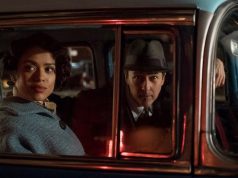When last we saw the great Chinese filmmaker Zhang Yimou, he was undergoing a bit of a mid-career renaissance, writing and directing the awe-inspiring martial arts film “Hero” after previously focusing on poignant dramas. He continues on that path with “House of Flying Daggers,” yet he goes back to earlier films like “Not One Less” and “The Road Home,” too, as “Flying Daggers” is, at its heart, an emotional story about love and betrayal. In many ways, it is Yimou’s most accomplished and beautiful film.
It takes place in the 9th century A.D., in an area where the local police grapple frequently with the Flying Daggers, a secret group of vigilantes and guerrilla warriors who go about righting wrongs and fighting injustice and bringing down The Man. There is much call for the Flying Daggers, as the government is corrupt and heartless — traits that make it even less sympathetic toward underground organizations like the Flying Daggers.
Two local policemen, Jin (Takeshi Kaneshiro) and Leo (Andy Lau), get word that a member of the Flying Daggers has begun working as a courtesan at the local “entertainment house,” as it is called, so Jin goes undercover. He hopes to meet her, gain her trust, and follow her back to the Flying Daggers’ secret headquarters.
To an extent, the plan succeeds. The woman, Mei (Ziyi Zhang), who is beautiful, an expert fighter, oh, and blind since birth, is indeed a Flying Dagger. The government believes she is the daughter of the Daggers’ former leader, whom the government assassinated (which makes her especially dangerous now, should she encounter any government agents).
Mei and Jin almost immediately begin to fall in love, apparently for real, despite Jin’s ulterior motives. The romance complicates Jin’s attitude toward the operation, and so do Mei’s almost-supernatural instincts: She often detects Jin’s fellow officers lurking in the foliage as they journey to Flying Dagger headquarters, which means she and Jin have to fight them, Jin making sure to defeat but not kill his cohorts. When the federal government, apathetic toward local law enforcement officers, takes over the pursuit of Mei and the Flying Daggers, Jin’s company can no longer guarantee his safety.
As a blend of war and love, the film is not just a series of battle sequences, the way “Hero” was. When the fights do come, however, Zhang directs them with as much precision and artistry as in that earlier film. One fight takes place in a bamboo forest, with many of the maneuvers occurring at the tops of the trees, gravity boldly and beautifully defied. Even Mei’s dancing as a courtesan earns a skillful cinematographic treatment. Zhang seems to believe that there is no such thing as an unimportant shot, and that if something is going to appear in his film, it is going to be photographed with style and meaning.
The cinematographer is named Xiaoding Zhao, and he has no prior credits listed on the Internet Movie Database. I wonder if this can be a mistake. His work in “Flying Daggers” is exquisite, often breathtaking, far more so than one would expect for someone with no previous feature-film experience.
The film begins with an autumnal feel, all gray skies and earth tones, and not the usual spring colors associated with a budding romance. The wistfulness suggests Mei and Jin are not destined for happiness together, a feeling borne out by the movie’s wintry finale. In the middle, we gradually move to the lush green colors of the bamboo forest and the Flying Daggers’ uniforms. Some of these visuals are stunning, absolutely stunning. It is not often that a movie can inspire discussion based solely on its use of color, but there you go.
The final battle, between Mei, Jin and a third character, is marked by its intentional lack of gracefulness. It is too personal now; lovers have been stabbed in the back and in the heart — in some cases literally, I might add — and the fighting takes on a brutal, bloody quality. The fighters do not fly anymore. They remain earthbound, scratching, crying and bleeding in a most non-balletic fashion. Zhang is at his most insightful here, no longer alternating between scenes of combat and scenes of love, but combining them into one stirring finale.
A- (1 hr., 58 min.; Chinese with subtitles; )





